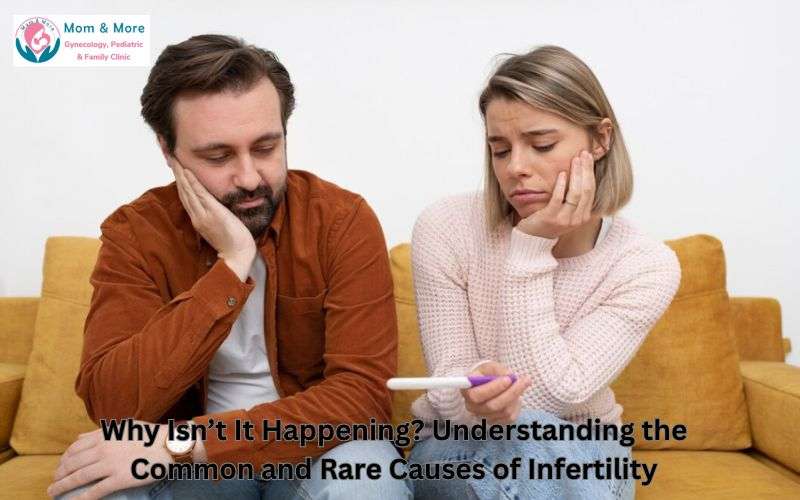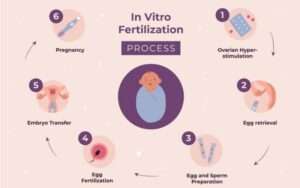Why Isn’t It Happening? Understanding the Common and Rare Causes of Infertility

Introduction
Infertility is a deeply personal and often challenging journey, affecting millions of couples worldwide. Despite advancements in reproductive health, infertility remains a complex condition with numerous potential causes, some well-known and others more obscure. Understanding these causes can be instrumental in guiding patients and providing hope. At Mom And More Clinic, Dr. Yasmin Imdad, Senior Consultant – OBG & Infertility, dedicates her expertise to helping couples understand and address the root causes of infertility. This guide delves into both common and rare causes of infertility, equipping readers with a comprehensive overview.
What is Infertility?
Infertility is medically defined as the inability to achieve pregnancy after a year of regular, unprotected sex. It affects around 15% of couples globally, with both men and women equally contributing to infertility cases. Primary infertility occurs in couples who have never conceived, while secondary infertility affects couples who have previously conceived but now face challenges. Recent statistics from the World Health Organization indicate that approximately 1 in 6 people globally experience infertility issues, highlighting its prevalence and the need for awareness.
Common Causes of Infertility
Infertility can arise from multiple factors, including age, lifestyle, and underlying health conditions. Here are the primary causes of infertility in both men and women.
Female Infertility Causes

- Hormonal Imbalances: Conditions like Polycystic Ovary Syndrome (PCOS) and thyroid disorders disrupt hormone levels, affecting ovulation and fertility.
- Age-Related Factors: Female fertility gradually declines with age, notably after age 35. This decline is due to the reduction in both the quality and quantity of eggs.
- Fallopian Tube Blockages or Damage: Blocked or damaged fallopian tubes prevent sperm from reaching the egg. Conditions like endometriosis and pelvic inflammatory disease (PID) are common causes.
- Ovulation Disorders: Irregular or absent ovulation often signals hormonal irregularities, such as those caused by PCOS or elevated prolactin levels.
Male Infertility Causes
- Low Sperm Count and Quality: A low sperm count or abnormal sperm shape and movement can impact fertility.
- Hormonal Imbalances: Hormone irregularities, often related to testosterone or pituitary hormones, affect sperm production and quality.
- Varicocele: This condition involves enlarged veins within the scrotum, which can raise scrotal temperature and reduce sperm quality.
- Lifestyle and Environmental Factors: Factors like diet, exposure to toxins, and habits such as smoking can negatively impact sperm health and fertility.
Rare Causes of Infertility
While less common, certain genetic, immune, and anatomical issues can lead to infertility.
- Genetic Factors: Chromosomal abnormalities, such as Klinefelter syndrome in men and Turner syndrome in women, impact reproductive function.
- Autoimmune Disorders: In rare cases, the immune system may attack reproductive tissues, including sperm or eggs, reducing fertility.
- Uterine Abnormalities: Physical issues like fibroids, polyps, or a malformed uterus can interfere with embryo implantation.
- Infections and Diseases: Certain infections, such as tuberculosis in reproductive organs, though uncommon, may lead to infertility.
- Unexplained Infertility: For some couples, all standard tests appear normal, yet conception remains elusive. This condition can be particularly challenging, though advances in diagnostics continue to offer new insights.
Lifestyle and Environmental Factors
Everyday lifestyle choices can significantly influence fertility. Here are some critical factors:
- Diet and Nutrition: A balanced diet supports reproductive health. Deficiencies in nutrients like iron, zinc, and folate can disrupt reproductive function.
- Stress: Chronic stress affects hormone production, impacting both male and female fertility.
- Weight Management: Obesity and being underweight are both linked to infertility. Maintaining a healthy body mass index (BMI) is essential for reproductive health.
- Smoking, Alcohol, and Substance Use: Tobacco and alcohol can harm reproductive organs and reduce fertility, with studies showing that smokers may have a 30% higher risk of infertility.
How Infertility is Diagnosed
At Mom And More Clinic, Dr. Yasmin Imdad emphasizes a thorough, individualized approach to infertility diagnostics, understanding that every patient’s journey is unique. Diagnostic procedures include:
- Female Tests: Hormone testing (FSH, LH, AMH levels), ultrasound imaging for uterine and ovarian health, and ovulation monitoring.
- Male Tests: Semen analysis to assess sperm health, hormone testing, and physical examination.
- Additional Testing: If initial tests don’t clarify the cause, further assessments like hysterosalpingography (HSG) for women or genetic testing may be recommended.
Advanced Treatments for Infertility

With advancements in reproductive medicine, various treatments now offer hope for couples facing infertility.
- Medications for Hormonal Balance: For conditions like PCOS or thyroid imbalances, hormone-regulating medications can enhance ovulation.
- In Vitro Fertilization (IVF): IVF involves fertilizing an egg outside the body and then implanting it in the uterus, often helpful for couples with blocked tubes or unexplained infertility.
- Intrauterine Insemination (IUI): Sperm is directly placed into the uterus, increasing the likelihood of fertilization.
- Lifestyle Modifications and Counseling: Guidance on stress management, diet, and exercise can positively impact fertility outcomes. Dr. Yasmin Imdad and her team at Mom And More Clinic focus on personalized, holistic treatments tailored to each couple’s unique needs.
Tips and Advice for Couples Facing Infertility
For couples navigating the emotional and physical challenges of infertility, the following steps may be beneficial:
- Seek Help Early: Early intervention can be crucial, especially if you’re over 35 or have known health issues affecting fertility.
- Focus on a Healthy Lifestyle: Balanced nutrition, regular exercise, and stress management can improve reproductive health.
- Stay Informed: Understanding your body and consulting with a trusted fertility expert, like Dr. Yasmin Imdad at Mom And More Clinic, empowers you to make informed decisions.
- Consider Counseling: Infertility can take a toll on mental health. Counseling provides emotional support during this journey.
Conclusion
Infertility is a complex condition, but understanding the underlying causes can lead to hope, guidance, and ultimately, solutions. Whether facing common or rare causes of infertility, early intervention and expert guidance play a critical role. At Mom And More Clinic, Dr. Yasmin Imdad provides compassionate, evidence-based care tailored to each patient, helping many couples on their path to parenthood. If you’re struggling with infertility, reach out today to explore options and take the first step towards realizing your dreams.
FAQs
Infertility can stem from hormonal imbalances, age, ovulation issues, or lifestyle factors like stress and smoking. Both men and women can face unique causes. At Mom And More Clinic, Dr. Yasmin Imdad provides expert evaluations to uncover each patient’s specific challenges.
Beating infertility often involves a mix of medical treatments—such as hormone therapy or IVF—and lifestyle adjustments like stress management and healthy eating. Dr. Yasmin Imdad at Mom And More Clinic offers tailored, compassionate care to help couples boost their fertility.
Resolving infertility starts with understanding its causes. Treatments range from medication to advanced options like IVF, alongside lifestyle improvements. Mom And More Clinic and Dr. Yasmin Imdad offer comprehensive solutions to support patients on their journey to parenthood.